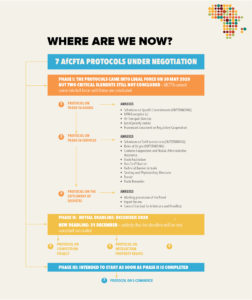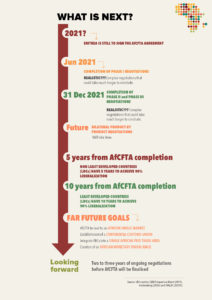The African Free Trade Agreement (AfCFTA) negotiations will take place in three phases. The first phase of the negotiations has lagged and trade unions have the opportunity to demand the right to be included in all the remaining negotiations.
To enter any negotiations on the AfCFTA as informed stakeholders, unions need to prepare and formulate their demands accordingly.
The development of the AfCFTA: The three phases of the AfCFTA negotiations
Where are we now?: Seven AfCFTA protocols under negotiation

Source: LRS/ITUC (2021), based on Albert (2019), Hartzenberg (2020) and TRALAC (2021)
Click here to enlarge the image
PHASE I: Trade in Goods, Services, and Dispute Settlement – not completed
Due date: June 2021
Phase 1 negotiations entered into legal force on 30 May 2020. The negotiations involve:
- Protocol on Trade in Goods
- Protocol on Trade in Services
- Protocol on Rules and Procedures on the Settlement of Disputes
But three key sub-elements haven’t yet been concluded under Phase 1. The sub-elements are: Schedules of preferential tariff concessions; Preferential rule of origin; and Schedules of specific commitments on the five priority service sectors (business services; communications; finance; tourism; and transport).
The AfCFTA cannot come into force before Phase 1 negotiations are done. The areas to be negotiated during the first phase represent the minimum requirements for a Free Trade Area (FTA) The Trade Law Centre (TRALAC) notes the complexity of the outstanding issues and that means it could take longer to negotiate the issues.
“When 54 states at very different levels of economic development must adopt tariff cuts for 90% of tariff lines (not 90% of trade) as well as rules of origin, while maintaining existing Regional Economic Community (REC) structures and benefits, difficult and complicated compromises must be reached.”
~ TRALAC (2020)
PHASE 2: Competition Policy, Intellectual Property Rights and Investment
Due date: 31 December 2021
Phase 2 of the AfCFTA negotiations concern the Protocol on Competition Policy, the Protocol on Intellectual Property Rights and the Protocol on Investment. The December 2020 deadline for Phase 2 negotiations was delayed due to the Covid-19 outbreak. The Protocols will take effect 30 days after 22 member states have ratified them.
PHASE 3: E-commerce
Due date: 31 December 2021
The final phase of the AfCFTA negotiations concerns the Protocol on E-commerce. Negotiations will begin immediately after Phase 2.
Looking forward – An opportunity to influence the AfCFTA in real-time
The issues on the table are complex and it could take several years to complete the negotiations. Also, the actual implementation phase of the AfCFTA is a gradual process. Countries will have to bilaterally negotiate product for product within the parameters of the African Union mandate. As such, trade unions have the opportunity to influence the remaining Protocols of the AfCFTA.
The existing Regional Economic Communities (RECs) will also need to negotiate among themselves and other member states. These negotiations represent more areas of involvement for unions.
The African Union has great aspirations for the AfCFTA beyond the immediate implementation of the agreement. The AfCFTA aims to accomplish the following:
- Create an African single market for goods and services
- Establish a Continental Customs Union
- Integrate RECs into a single African free trade area
- Create an African Monetary Union (AMU).
Given the political and cultural differences in Africa, trade unions should demand inclusion in any form of negotiations. Further, unions should build relevant partnerships and networks for providing information on the AfCFTA process. This will enable real-time monitoring of the AfCFTA and the associated initiatives or negotiations.
Development of the AfCFTA – What is next?

Source: LRS/ITUC-Africa (2021), based on Albert (2019), Hartzenberg (2020) and TRALAC (2021)
Click here to enlarge the image
The trade union response
What do trade unions need to look out for and deliberate?
To achieve a transformative AfCFTA, the trade union movement and all other relevant stakeholders must have the right to engage in negotiations. Unions need to ensure that the incremental implementation of the agreement will not undermine hard-won gains. These include national labour standards, stability of labour markets and organisational development of trade unions.
Union’s participation in all future AfCFTA negotiations will ensure that labour provisions are incorporated within the AfCFTA. Trade unions have the opportunity to influence the process and in real-time, and some key areas to focus on are;
- Negotiations Phase I, with a focus on Schedules on Tariff Concessions and Rules of Origin
- Negotiations Phase 2
- Negotiations Phase 3
- Bilateral “product for product” negotiations
- Initiatives beyond the implementation of the AfCFTA such as the development of a single African Free Trade Area
What should be the demands of unions?
- Demand a seat at all AfCFTA negotiation tables going forward.
- Demand the right to give input to your local government before it conducts any AfCFTA-related negotiations such as tariff reductions.
- Demand an evaluation of the potential impact of the AfCFTA on the Decent Work Agenda and workers. Use the information to support the union’s negotiating positions.
You might like:
Marie Daniel
Marie Daniel is an Associate at Labour Research Service. Marie has an urban studies and development economics background and one of her research passions is organisation and participation approaches within the informal sector. She is intrigued by the manner in which participatory democracy is approached and implemented in South Africa.
